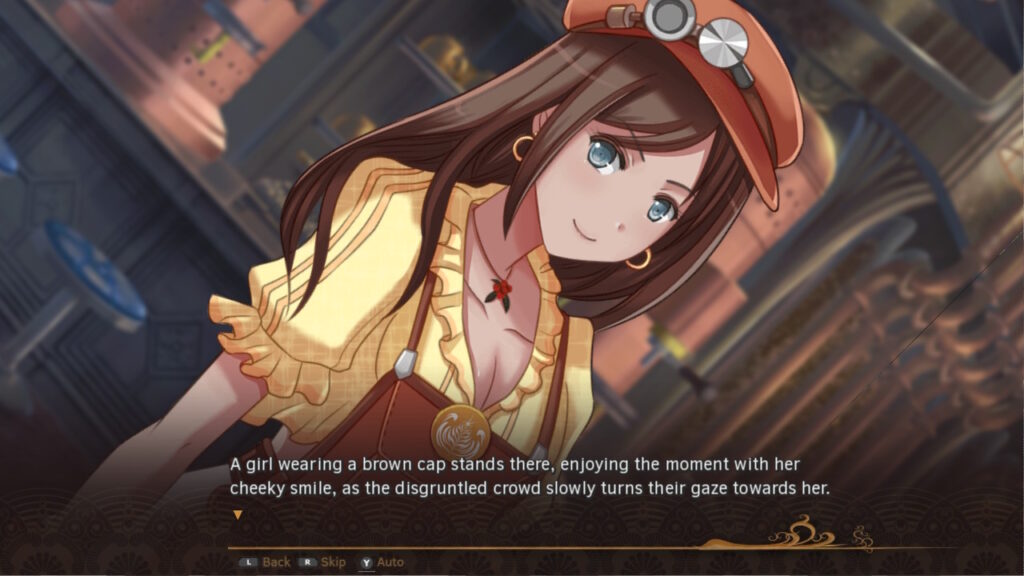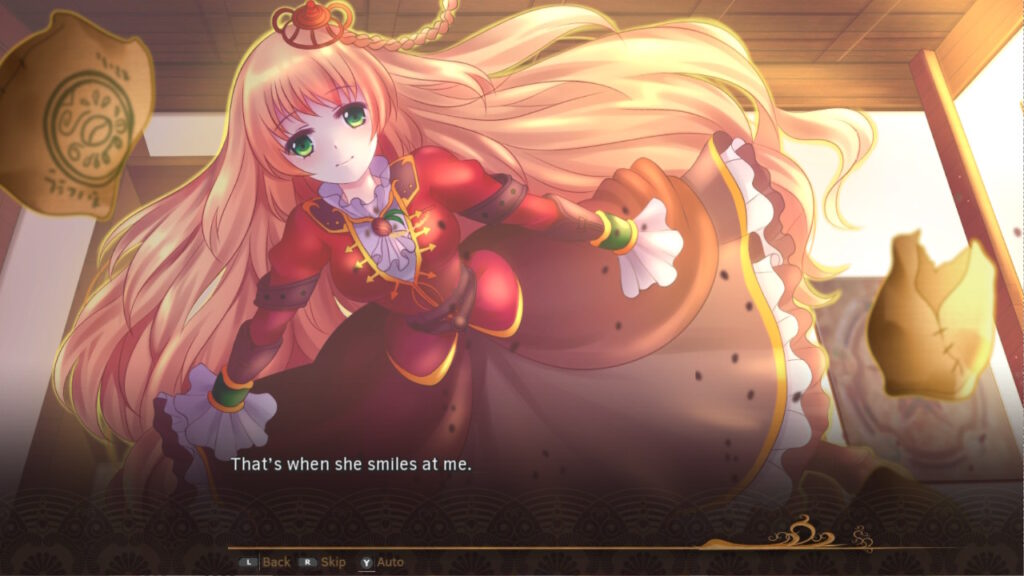
Developer: Kikai Digital
Publisher: Ratalaika Games, Kikai Digital
Platform: PC, PS4, Xbox One, Switch
Tested on: Switch
Caffeine: Victoria’s Legacy – Review
Hot on the heels of Aquadine, we’re already looking at another visual novel that’s been brought to consoles courtesy of Ratalaika Games. Caffeine: Victoria’s Legacy is a fantasy adventure visual novel set in a steampunk Victorian reality, which was originally released on PC back in 2020, after a successful Kickstarter campaign. The title recently made the jump to consoles and given that the Switch is our preferred platform to read visual novels, taking a look at Caffeine on the platform seemed like a no-brainer. Is this the definitive visual novel for caffeine addicts or are you better off sticking to NecroBarista or Coffee Talk?
Story
Set in a world where drinking coffee gives you superpowers -no, really- Caffeine introduces us to Taka Knight, a young boy searching for his mother, who has been missing for years. After surviving a plane crash, Taka finds himself in the city of Victoria, a place where pretty much everything revolves around coffee. It’s clear that Taka isn’t in a familiar place: inhabitants are confused by his references to current-day technology and pop culture. Fortunately for our protagonist, he just happens to run into a coffee shop that might hold the answers to his mother’s whereabouts, as it used to be owned by his parents when he was a child. After passing the royal barista test, Taka even manages to land a job at the struggling coffee shop, where he quickly befriends the current owner, Alice. As luck would have it, Taka’s path also crosses with that of three other young women: the soft-spoken Eliza, the ambitious and feisty Mel, and the temperamental Oceane. In classic visual novel tradition, these women are all potential suitors for our young hero, of course, and they all have their own ending apart from Caffeine’s “true” ending.
Although Caffeine is billed as a fantasy adventure first and foremost, what you’re getting here feels more like a romance novel instead. It’s stuffed to the brim with tropes and character archetypes that we’ve seen dozens of times in the past in visual novels that are more open about their intentions. Granted, the steampunk (or should that be coffeepunk?) setting doesn’t exactly present the same atmosphere as your everyday slice-of-life Japanese high school romance story, so we should give Caffeine credit where it’s due. In the end though, your main driving force behind reading through the story is still going to be to see protagonist Taka end up with the girl of your choice. Likewise, if you’re revisiting the story, you’re probably doing so to romance the other girls and see those endings play out. It’s all in good taste of course -this is a game rated ‘T’ after all- and for what it’s worth, Caffeine is successful in what it sets out to do, but we did feel like the game being promoted as a fantasy adventure first and foremost on the eShop felt a bit misleading.
Of course, we won’t spoil the overarching mystery of Taka’s missing mother and how her disappearance ties into Victoria’s coffee obsession, but we did feel like Caffeine’s narrative missed the mark in a couple of key areas. The pacing often felt off, with the story dragging in some parts and feeling rushed in others, with plot twists following one another in quick succession. Perhaps the most irksome thing about the story is that Caffeine simply expects the players to accept things without fully explaining them: Victoria is set in a different reality, for example, and it’s never explained how Taka is able to return home -or how it’s even possible that his parents were able to hop between realities. Likewise, we would’ve liked it if more explanation had gone into the way Victoria’s society historically grew to be structured around coffee. We know it makes drinkers more powerful and allows them to duel -or use healing powers- but certain aspects of the impact on hierarchy feel like they are being glossed over. The story is well-written within the conventions of its genre, but once you start to apply critical thinking, Caffeine starts to show its cracks. On the upside, we did feel like the cast itself was well-written and likable, with clear motivations, even if the characters embodied specific anime archetypes.
Graphics
The noticeable anime influences are present in Caffeine’s visuals as well, with an art style that emulates conventional anime art direction. We did feel like Caffeine was stylistically inconsistent: the majority of the art is decent enough, though we felt like the game didn’t have its own distinct visual identity. It’s likely that different artists worked on the project, each infusing their own style into the specific pieces of artwork they provided, but the overall result feels like Caffeine’s visuals are made up of fan art for a different project, rather than a polished, official release. Just compare the screenshot below this paragraph with the one above to see how wildly different the art styles are. That said, Caffeine does manage to look dynamic thanks to animated sprites and dynamic angles in the CG art.
Sound
Of note is that Caffeine is one of the few visual novels that incorporates voice acting. Granted, voice work is limited to key lines rather than having a fully voice-acted rendition of the story, but even hearing a handful of lines really helps with bringing these characters to life. We also quite enjoyed the relaxing piano music that accompanied us as we read about Taka’s exploits, though it wasn’t particularly memorable nor did we feel that it was an essential immersive element. If it wasn’t for the voice snippets, we’d go as far as to say that you could easily turn the sound off here and listen to your own music of choice instead.
Gameplay
Unlike its predecessor, Aquadine, which only presented players with a single ending-altering choice, Caffeine is very much a choice-driven narrative. We did feel like our choices mattered when it came to romancing the female characters, and there are multiple endings, both good ones and bad ones, for each girl. Apart from this, what you’re getting here are the standard visual novel “gameplay” options, of course, such as being able to skip text that you’ve already read in previous playthroughs and an autoplay function. A single readthrough of Caffeine will take most people around 5 hours and those that wish to see every storyline play out will probably spend between 20 and 25 hours with Caffeine, depending on reading speed. Add to this that the game also offers a music player and a gallery for any CGs that you’ve unlocked and what you’re getting here is a pretty sizable package. We were initially concerned that Caffeine wasn’t going to offer enough content to justify the €18 asking price, but the game certainly delivered on that front. So if you’re a fan of anime tropes, visual novels, or just coffee, then you could do far worse than Caffeine. For most people though, Caffeine will be a middle-of-the-road experience.
Conclusion
Caffeine stands out through its coffee-gives-people-superpowers premise but fails to really capitalize on it. There isn’t anything inherently wrong with Caffeine as a visual novel, and it certainly ticks all the necessary boxes for the niche it aims to fit into, but an overreliance on character tropes and uneven narrative pacing also prevent the story from feeling memorable. For what it’s worth, the individual cast members definitely are charming, even if they aren’t particularly original, and you’re certainly getting your money’s worth in terms of content. If you’re a genre aficionado, you’ll probably enjoy your time with this visual novel, but if you’re looking for a literary masterpiece, then Caffeine won’t scratch your itch.
Caffeine: Victoria's Legacy - Review,1 Comment
Leave a Reply
You must be logged in to post a comment.









[…] it’s Caffeine’s power-inducing brews, Necrobarista’s nightly conversations over a cup of joe, or even […]